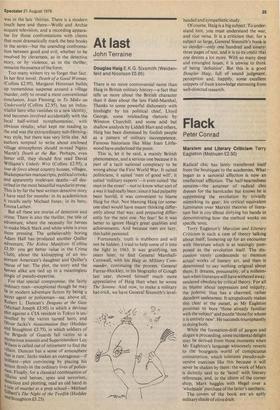At last
John Terraine
Douglas Haig E.K.G. Sixsmith (Weidenfeld and Nicolson £5.95)
There is no more controversial name than Haig in British military history—a fact that tells us more about the British character than it does about the late Field-Marshal. Thanks to some powerful dishonesty with hindsight by his political chief, Lloyd George, some misleading rhetoric by Winston Churchill, and some acid but shallow analysis by Liddell Hart and others, Haig has been dismissed by foolish people as a pattern of military incompetence. Famous historians like Miss Joan Littlewood have underlined the point.
This is, let it be said, a mainly British phenomenon, and a serious one because it is part of a tacit national conspiracy to be wrong about the First World War. It suited politicians, it suited 'men of good will', it suited 'military experts'—it even suited 'the man in the street'—not to know what sort of a war it had really been; since it had palpably been horrid, it was convenient to blame Haig for that. Not blaming Haig (or someone else) would have meant thinking differently about that war, and preparing differently for the next one. No fear! So it was better to ignore Haig's great qualities and achievements. And because men are lazy, this habit persisted.
Fortunately, truth is stubborn and will not be hidden. [tried to help some of it into the light in 1963. It was gratifying, ten years later, to find General MarshallCornwall, with his Haig as Military Commander, continuing the process. General Farrar-Hockley, in his biography of Gough last year, showed himself much more appreciative of Haig than when he wrote The Somnze. And now, to make a military hat-trick, we have General Sixsmith's level
headed and sympathetic study.
Of course, Haig is a big subject. To understand him, you must understand the war, and vice versa. It is a criticism that, for a subject so large, General Sixsmith's book is so slender—only one hundred and ninetythree pages of text, and it is to its credit that one desires a lot more. With so many deep and entangled issues, it is unwise to think of being 'definitive'. But this is a good Douglas Haig, full of sound judgment, perception and, happily, some excellent snippets of fresh knowledge stemming from well-directed research.


































 Previous page
Previous page